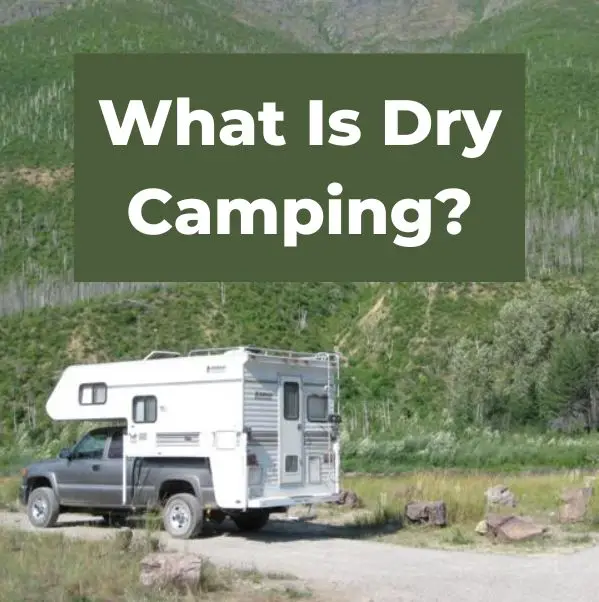With so many options for spending time outdoors, the choices can seem endless. One very popular way of camping is dry camping. But what is dry camping exactly? Dry camping is camping in an RV, van, or motorhome with no electric, water, or sewer hookups.
Unlike tent camping, dry camping allows campers to set up camp on public lands or sometimes private places, with the permission of the owner.
Dry camping is also known as boondocking and is a great way to experience the great outdoors without the distractions of modern-day technology.
One of the advantages of off-grid camping is that it allows campers to save money on campsite fees. Unlike traditional campgrounds that charge a fee for hookups, boondocking is usually free.
This makes it an attractive option for budget-conscious campers, and dry camping allows campers to explore remote areas that are not accessible by traditional campgrounds, providing a unique and secluded experience.
Dry camping also comes with its own set of challenges. Without hookups, campers need to be self-sufficient and bring their own water, food, and power sources.
This requires careful planning and preparation to ensure a safe and enjoyable camping experience.
Camping off the grid is a great way to experience the great outdoors and connect with nature, but it requires a certain level of preparation and self-sufficiency.
We’ll cover what dry camping is in depth, the pros and cons, and how to prepare for a successful boondocking trip in today’s guide.
What is Dry Camping?
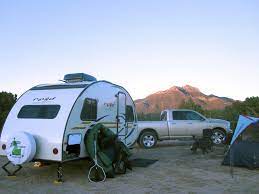
Dry camping is when campers set up their RV, van, or motorhome without any hookups to water, electricity, or sewer systems.
This means that they are self-contained and rely on their own resources to sustain themselves during their camping trip.
Unlike traditional campgrounds, boondocking is often done on public lands or private places with the permission of the owner.
This type of camping is also known as boondocking or dispersed camping, where campers can explore natural landscapes and enjoy a more primitive camping experience.
Off-grid camping can also be done in a tent, where campers bring their own water and supplies, and camp in less restricted areas, and is a great way to disconnect from the outside world and enjoy the beauty of nature.
While dry camping may not be as convenient as staying in a traditional campground with hookups, it offers a unique and rewarding experience for those who enjoy off-the-grid living.
It also allows campers to save money on camping fees and explore new places that may not be accessible through traditional means.
Overall, camping off-grid is a great way to experience the outdoors in a more primitive and self-sufficient way
It is important to note that campers should always follow Leave No Trace principles and respect the environment while dry camping.
Advantages of Dry Camping
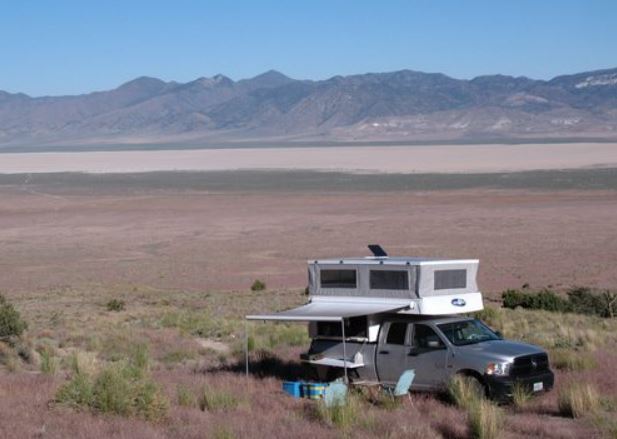
Dry camping is a unique experience that offers several advantages to seasoned campers and beginners alike.
Here are some of the benefits of dry camping:
Cost-effective
One of the most significant advantages of boondocking is that it is cost-effective.
Unlike traditional retreats, camping without amenities doesn’t require campers to pay for designated campsites or things like water and electricity hookups.
Instead, off-grid camping is often free or costs very little, which makes it an ideal option for budget-conscious campers.
More Personal Space
Dry camping also provides campers with more personal space.
Unlike traditional campsites, which can be crowded and noisy, dry camping allows campers to choose a location away from the hustle and bustle of public spaces.
This allows campers to enjoy the peace and quiet of nature and their surroundings.
Conservation
Dry camping is an eco-friendly way of camping.
By not relying on electricity and water hookups, campers can conserve resources and reduce their environmental impact.
This makes dry camping an ideal option for campers who are passionate about conservation and want to minimize their ecological footprint.
Less Restricted
Dry camping is also less restricted than traditional camping.
Campers are not limited to designated campsites and can choose to camp wherever they want, as long as it is legal and safe.
This gives campers the freedom to explore new locations and discover hidden gems that they might not have found otherwise.
Practicing Skills
Dry camping is an excellent opportunity for campers to practice their camping skills.
Since dry camping requires campers to be self-sufficient, it provides an opportunity to learn new skills like building a fire, purifying water, and setting up a campsite.
This makes dry camping an ideal option for campers who want to improve their camping skills and become more self-reliant.
See Related: How to Keep A Fire Going In A Fire Pit
Tips for Dry Camping
Here are some tips that can help campers make the most of their dry camping experience:
- Plan ahead and bring all the necessary supplies, including food, water, and camping gear.
- Choose a safe and legal location to camp.
- Be prepared for the weather and bring appropriate clothing and gear.
- Respect nature and leave no trace of your presence.
- Be mindful of noise levels and respect other campers’ privacy.
- Practice fire safety and follow local fire regulations.
Dry camping offers several advantages to campers who want to enjoy the beauty of nature without breaking the bank.
By being self-sufficient and responsible, campers can make the most of their dry camping experience and create memories that will last a lifetime.
Disadvantages of Dry Camping
Dry camping is a unique camping experience that offers campers a chance to get away from the hustle and bustle of daily life, but it also comes with its own set of disadvantages that campers should be aware of before embarking on a dry camping trip.
One of the main disadvantages of dry camping is the lack of amenities.
Unlike traditional camping, dry camping does not provide campers with access to electrical hookups, running water, or dump stations.
This means that campers must rely on alternative sources of power and water, such as solar panels, generators, and water tanks.
Additionally, campers must be prepared to pack out all of their waste, including black and grey water, and dispose of it properly.
Another disadvantage of dry camping is the legal aspect.
While it can be tempting to simply park and camp wherever you wish, it is important to know and follow all laws and regulations regarding camping on public lands.
Failure to do so can result in fines and legal trouble.
Dry camping also requires more work and preparation than traditional camping.
Campers must ensure that they have enough food, water, and supplies to last the duration of their trip, as well as a reliable shelter to protect them from the elements.
You also must be prepared to deal with any medical emergencies that may arise, as well as properly store any medication that they may need.
Finally, dry camping can be more expensive than traditional camping.
While camping fees may be lower or non-existent, campers must be prepared to invest in the necessary equipment, such as solar panels and water tanks, to make their trip a success.
Overall, while dry camping can be a rewarding and unique experience, it is important to be aware of the potential drawbacks and prepare accordingly.
Planning for Dry Camping
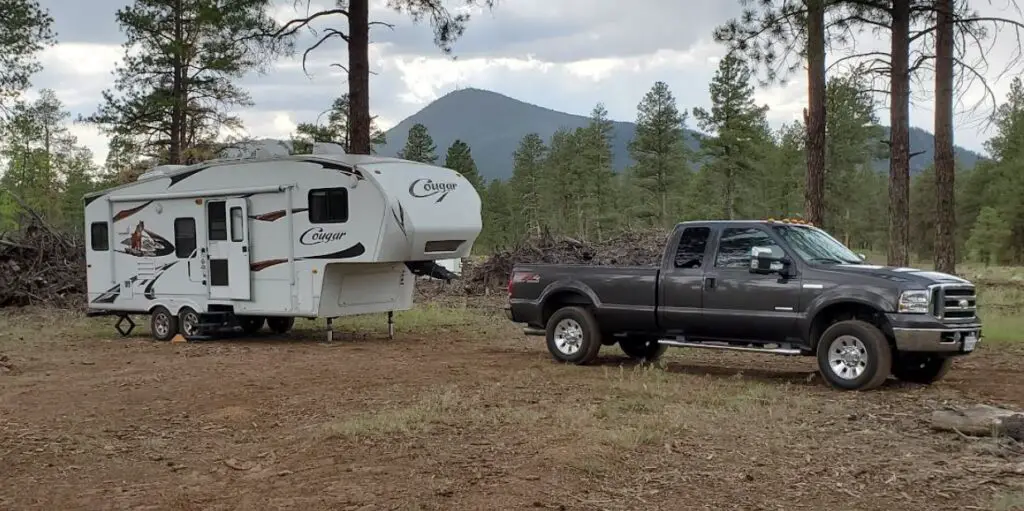
When planning for dry camping, it is important to consider several factors to ensure a safe and comfortable experience.
The following are some essential aspects to keep in mind:
Water
One of the most critical considerations for dry camping is water.
Without access to running water, campers must bring their own supply for drinking, cooking, and cleaning.
It’s recommended to bring at least one gallon of water per person per day.
Campers can also conserve water by using biodegradable soap and limiting showers.
Power & Fuel
Dry camping also requires a power source for lighting, cooking, and charging electronic devices.
Campers can opt for solar panels, generators, or a combination of both.
Solar panels are an eco-friendly option that harnesses energy from the sun, while generators provide a reliable power source.
Be sure to bring extra fuel for generators, extra propane, and to follow safety precautions when using them.
See Related: How Much Propane Does an RV Fridge Use and How to Read a Propane Gauge
Food
When dry camping, campers must bring their own food and cooking supplies.
Plan meals ahead of time and bring non-perishable items such as canned goods and dried fruits.
Campers can also bring a portable grill or camping stove for cooking.
See Related: The Best Canned Foods For Camping & RV Outdoor Kitchen Ideas
Amenities
Dry camping does not provide access to amenities such as bathrooms and showers.
Campers must bring their own portable toilet, or use designated public restrooms.
You can also consider bringing a solar shower for bathing.
Leave No Trace
When dry camping, it is important to practice Leave No Trace principles to minimize impact on the environment.
This includes packing out all trash and waste, using designated fire rings, and respecting wildlife.
Emergency Supplies
Prepare ahead by bringing emergency supplies such as a first aid kit, extra food and water, and a map and compass.
It is also recommended to bring a satellite phone or emergency beacon in case of an emergency.
Technology and Camping Gear
Lastly, campers can enhance their dry camping experience with technology and camping gear.
This includes portable fans, lanterns, and sleeping bags.
Choose gear that is lightweight and compact for easy transport.
Special Considerations
Dry camping requires some special considerations to make the experience comfortable and safe.
Here are some tips to help make your dry camping trip a success:
Selecting Your Power Source
When dry camping, you need to have a reliable power source.
You can use a generator, solar panels, or batteries to power your RV.
Each option has its pros and cons, so you need to consider your needs and budget when selecting your power source.
Conserving Water
Water is a precious resource when dry camping, and you need to conserve it.
You can reduce your water usage by taking shorter showers, turning off the water when brushing your teeth, and using paper plates and cups.
You can also bring extra water containers and refill them when you find a water source.
Managing Your Grey and Black Tank Capacity
When dry camping, you need to manage your grey and black tank capacity carefully.
Grey water is the wastewater from your sinks and shower, while black water is the wastewater from your toilet.
You can extend your tank capacity by using public restrooms and showers, and by using a composting toilet.
See Related: Problems with Filling RV Fresh Water Tank, How to Clear A Blockage In Your RV Black Tank, and Can You Dump Gray Water On The Ground?
Plan Your Trash Disposal
You also need to plan your trash disposal carefully.
You can’t leave your trash in the wilderness, so you need to pack it out with you.
You can use trash bags and containers to store your trash, and dispose of it in a proper trash receptacle when you leave the camping area.
Dry camping can be a fun and rewarding experience, but it requires some planning and preparation.
By following these tips, you can make your trip a success.
Dry Camping Safety
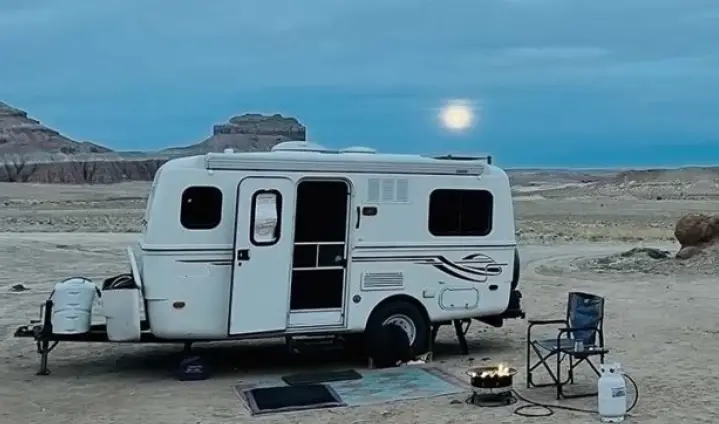
Safety should always be a top priority no matter where you’re staying outdoors.
Here are some tips to ensure a safe and enjoyable experience:
Choose a Safe Location
When selecting a location for off-grid stays, it’s important to ensure that the area is safe.
Look for well-lit areas that are free from hazards such as steep drop-offs or dangerous wildlife.
It’s also a good idea to research the area beforehand to ensure that it’s not known for criminal activity.
Be Prepared for Emergencies
You should always be prepared for emergencies.
This includes having a first aid kit on hand, as well as extra food, water, and clothing.
It’s also a good idea to have a communication device such as a satellite phone or two-way radio in case of emergencies.
Keep Food Secure
Ants and other wildlife can be a common problem when staying in remote areas.
To prevent ants from getting into your food, store it in airtight containers or coolers.
It’s also a good idea to keep your campsite clean and free from food debris.
See Related: What Smells Deter Bears?
Practice Fire Safety
Every outdoor stay usually involves campfires for cooking and warmth.
It’s important to practice fire safety to prevent accidents.
Keep a bucket of water or sand nearby in case of emergencies, and never leave a fire unattended.
Respect the Environment
Dry camping often takes place in natural areas, and it’s important to respect the environment.
This includes packing out all trash and leaving the area in the same condition as you found it.
It’s also important to follow any rules or regulations set forth by the landowner or governing agency.
By following these tips, boondocking can be a safe and enjoyable experience.
Where to Dry Camp
Dry camping offers a unique opportunity to explore the great outdoors in a more intimate way.
But where can you do it? Here are some options for where to dry camp:
National Parks and State Parks
Many national parks and state parks offer dry camping options.
These parks often have designated areas for it which may include picnic tables, fire pits, and access to restrooms and water.
Note that these sites may not have hookups for electricity, water, and sewer.
RV Parks
Some RV parks offer dry camping sites for those who prefer a more rustic experience.
These sites may be cheaper than full hookup sites, but they may also lack amenities like showers and laundry facilities.
Public Lands
Public lands, such as those managed by the Bureau of Land Management (BLM), offer a wide range of opportunities for off-grid camping.
These lands may include deserts, forests, and other natural landscapes.
Be sure to research the specific rules and regulations for each area before setting up camp.
Private Places
Private resorts and campgrounds may also offer boondocking options.
These sites may have amenities like swimming pools and playgrounds, but they may also be more expensive than public lands and state parks.
Overall, there are many options for where to dry camp.
Whether you prefer the solitude of a remote natural landscape or the amenities of a private resort, there’s a campsite out there for you.
Just be sure to do your research and follow all rules and regulations to ensure a safe and enjoyable camping experience.
Conclusion
In conclusion, dry camping is a unique and exciting way to experience the great outdoors.
It allows campers to disconnect from the hustle and bustle of daily life and enjoy the peace and quiet of nature.
While off-grid camping may not be for everyone, those who enjoy it often find it to be a rewarding and fulfilling experience.
One of the biggest advantages of boondocking is the freedom it provides.
Campers can set up camp virtually anywhere, from public lands to private property with permission.
This allows for a more personalized and unique camping experience.
However, it’s important to note that camping without hookups also comes with its own set of challenges. Without access to electricity or running water, campers must be prepared to bring their own supplies and be self-sufficient.
This requires careful planning and preparation to ensure a safe and enjoyable trip.
Overall, dry camping is a great option for those looking to escape the crowds and enjoy a more secluded experience.
With the right preparation and mindset, it can be an incredibly rewarding way to connect with nature and enjoy all that the great outdoors has to offer.

